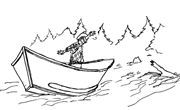Confessions of a Certified Safe Boater
What I learned makes me glad my boat’s in the back yard
by Maria Bellos
“Take the boating safety class,” my editor said. “On the Bay, it’s a matter of life or death.”
“Okay,” I said. After all, this was my job interview. I aim to please.
The more I thought about it, the more I ruminated on that “life or death” comment.
My boyfriend is a first-time boat owner, and despite his experience driving bass boats, he isn’t exactly a sailor. We bought the boat last year and took it out exactly three times. It broke down exactly three times. Each time, we were able to get it back to the marina without a tow, but those three treks were the sum total of our experience driving the boat. (I steered once.) Considering how much time I expected us to spend lolling helpless in the water, a safety course didn’t seem like a bad idea.
So I looked on the Department of Natural Resources website (http://dnrweb.dnr.state.md.us/nrp/boatingclass.html) and found several courses. Once we found a class that suited my work and his class schedule — he’s working on his Master’s — I signed us up and began to enjoy the anticipation. This course would make me a real boater, I thought.
The first night, I was surprised to discover several pre-teens, teens and young to old adults in the class. For some reason, I thought the class would be people in their 20s and 30s plus midlife crisis boat owners. How cool was it that these kids were growing up around boats and the Bay? When I was a kid, all we had was a rowboat and a lake.
When introductions came around to us, I identified myself as my boyfriend’s Gilligan and announced I was writing a story on the class. Our lead instructor, John Potts, U.S. Coast Guard, retired, was tickled, but the rest of the class seemed wary. Occupational hazard, I guess.
After introductions, we learned to tie a square and a figure-eight knot with rope the instructors provided.
All the Worst that Can Happen
We learned about legal requirements (22 questions on the test!), How to Save $250,000 by staying away from big commercial and military boats and Operation Bay Watch. That’s basically boaters watching for and reporting suspicious activity, but all I could think of was running down the beach in a red swimsuit, boobs bouncing in the Bay breeze.
Our instructor showed us safety equipment and different kinds of personal flotation devices (PFDs), which were mostly lifejackets. Between the life jackets, flares and fire extinguishers, boating seemed to me scarier, not safer. Topping off my fear, they told us that you can get fined and jail time for Boating Under the Influence of alcohol with a 0.8 breathalyzer reading. I know people who drink on their boats; in fact I thought everybody did. If anyone drinks like our friends do, I thought, we’re in big trouble.
We learned in the second class what I thought was the most valuable lesson: the rules of the road governing who has the right of way under what circumstances. I was happy (and surprised) to learn that there were rules. One basic rule: the biggest boat has the right of way. Duh. Still, good thing the boat broke down when we went out, I thought. At least we didn’t cause an accident driving around willy-nilly.
Boating emergencies dominated the third class. Potts taught us emergency procedures and scared the living daylights out of me with his stories. Last year, a grandfather went out in his boat with his granddaughter. When they didn’t return on time, his family called the Coast Guard, who found the deceased grandfather floating with his PFD and the granddaughter holding on to him. They saved the granddaughter. We keep our boat very close to where they found him. Brrr.
Warning us to secure a way to get back in the boat if we swim, Potts told us a story of two buddies. One went into the water and had a heart attack. He was a big guy, and his friend couldn’t pull him back on the boat. Rescuers responded within 10 minutes and attempted CPR, but couldn’t revive him. The point: His buddy couldn’t pull him out of the water to start CPR sooner; perhaps, had there been an easier way to get him into the boat, he could have been saved.
Now petrified, I followed the review for the test. Since I spent my time in class in a state of distracting fear, I wasn’t sure I would pass. Then I’d have to do this all over again. But I did, with only one question wrong. I got my boater safety card and am now a certified boater.
A Little Knowledge Is a Scary Thing
I still don’t know how to operate the boat, and I tend to freeze in emergencies (like when I set fire to the toaster oven last year). But the Coast Guard Auxiliary has confidence that I’ll be okay out there.
What I took away from the class was a different attitude about boating. It’s fun, yes, but it’s dangerous. Now I know, at least academically, how to react in an emergency, which I’ve learned could happen at any time.
Maybe it’s okay that our boat’s still under repair in the back yard.
Before coming to Chesapeake Country, New Yorker Maria Bellos published in home-state newspapers, Washington, D.C. magazines and trade journals. Her first story for Bay Weekly was How Mothers on the Edge Hang On (Vol. xiv, No. 19: May 11).
